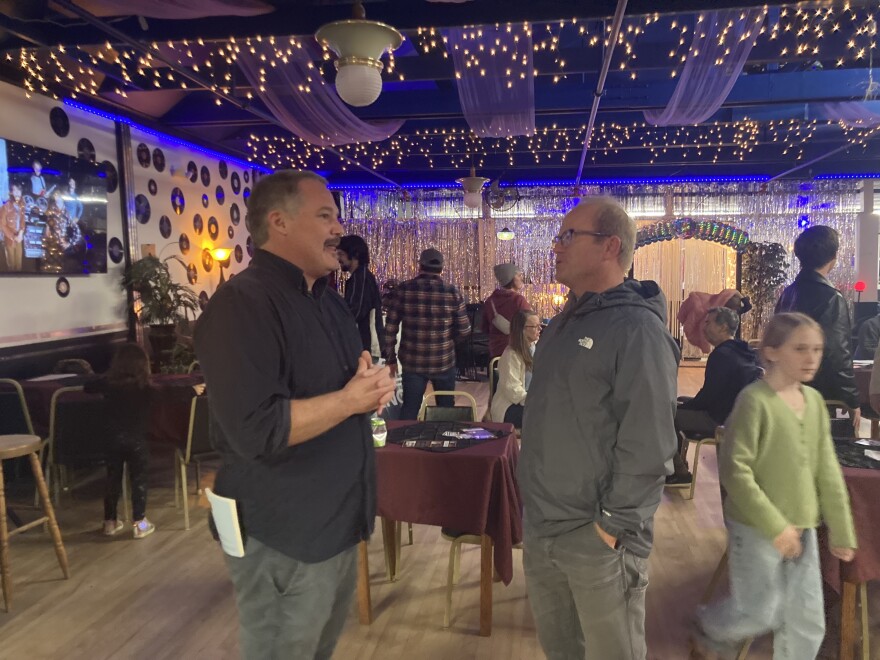When Democratic Sen. Chris Murphy of Connecticut came to deliver a speech in Concord last week, it could have been a scene from any recent decade in New Hampshire politics: a possible presidential hopeful, talking to a small roomful of local activists about the issues of the day.
But on this day — just hours after the longest government shutdown in U.S. history had ended, it didn’t take long before talk turned to what a member of the crowd called the “donkey in the room”: the decision by the state’s two Democratic senators — Jeanne Shaheen and Maggie Hassan — to join Republicans in passing the bill to reopen the government.
Murphy, like most Senate Democrats, opposed that plan, but on this day in Concord, he refrained from criticizing colleagues who backed it.
“We should not hide from the fact that there was a difference in tactics and strategy,” Murphy said, “though there wasn’t a difference in the values that we support.”
Not everyone in the room was so politic. Some were quick to call it evidence that Shaheen and Hassan are out of touch with the rank and file of the party they’ve long led in New Hampshire.
“The message we are hearing is that we shouldn’t speak ill of the Democratic party, because you don’t want to throw the baby out with the bathwater. But maybe it’s time to throw the babies out,” State Rep. Wendy Thomas said, as murmurs of assent rippled through the room. "And maybe it's time to get new babies."
Later, Thomas said her conversations with Democrats across the state have convinced her that if the party wants to win these days, particularly at the state level, it needs leaders who are more inclined to stand their ground than cut deals.
“People have had it with people who are not fighting — I have had it with people who aren’t fighting,” Thomas said. “It’s breaking establishment Dems versus the new babies on the block.”
The divides over the shutdown aren’t the only ones at play in the New Hampshire Democratic Party these days. While Democrats have dominated federal races here for years, it’s been almost a decade since the party held the governor’s office or a State House majority. For progressives, that record is proof that the party is increasingly out of touch with the voters it claims to serve.
“I think that if we really listen to the electorate, they are asking for something much different from what the Democratic Party is offering,” said former Executive Councilor Andru Volinsky who mounted an outsider-style run for governor in 2020.
The idea of shooting for something different was very much in the air as the Democratic Party’s lone declared candidate for governor, former restaurant-owner John Kiper, launched his campaign recently.
Kiper, 42, thinks for Democrats to win, they need to focus on policies that can attract more younger and working-class voters. According to Kiper, that includes policies to lower housing costs, hike taxes that hit the well-heeled, and legalize marijuana.
Kiper also wants to pay lawmakers a true salary, not the $100 a year they get now — a change he believes would quickly reorient State House policymaking.
“We are fighting not just Republicans, but really the system of New Hampshire and its brokenness and its antiquatedness,” Kiper said while standing before a rainbow-colored “Kiper for Governor” sign. “This is just all part of the struggle that we need to keep fighting for.”

The Newmarket ballroom at Kiper’s kickoff was less than full, but the crowd was engaged. It included a few state representatives, and also the progressive Democrats now challenging Congressman Chris Pappas’s bid for the U.S. Senate and Rep. Maggie Goodlander’s reelection in the 2nd Congressional District.
The room skewed young, but there was also 76-year old Charlie Fanning. He lives in Exeter, and says he’s done with establishment candidates: He plans to vote for Kiper and U.S. Senate Candidate Karishma Manzur.
“Both Jon and Karishma are, for lack of the better word, both ‘alternative’ candidates,” Fanning said. “We’ve been parading out these same traditional Democrats who are not getting the job done, even when they do get elected.”
That some party activists think that New Hampshire’s top Democrats are ineffectual isn’t remarkable. But a second term of President Trump, coupled with Democrats’ struggle to check his power, is fueling the kind of frustration that has progressive voters considering all their options. Candidates hoping to attract their support appear to be responding in kind.
Last week, Democrats running in the state’s 1st Congressional District were quick to take to TV and radio to criticize Hassan and Shaheen over their shutdown votes. One candidate compared the senators’ actions to crossing a picket line. Others talked of being “ashamed” and “betrayed,” and “turning anger into action.”
Anger and action have been on display for some time among at least one share of the 2026 electorate: the big crowds who have turned out for the series of “No Kings” protests staged across the state. Those events may give all Democrats hope, but they also feel like evidence that the direction of the party itself could be on the ballot in 2026 — maybe as much as the candidates themselves.








